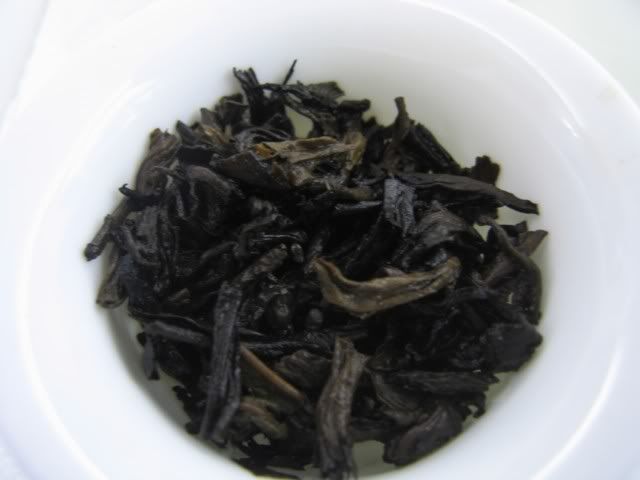When I went to Bonham Strand a few days ago I bought a little loose puerh from Lam Kie Yuen. The owner of the place, who is a very kind old gentleman with a lot of knowledge of the tea business, described this tea as having been through “swimming” storage. I’m not exactly sure what that means, but I’d imagine it’s a little wet.
I should note here, by the way, that the term in Chinese that describes dry or wet storage is “shicang 濕倉” (wet) and “gancang 乾倉” (dry). The word “cang” in this case is better translated as “storage” as in “storage condition”, but the word literally means “warehouse”. So you can also translate those terms as “wet warehoused” and “dry warehoused”, or some such. When talking about a tea that has been wet stored, it is usually only referred to, in Chinese, as “this tea has been through storage”. This issue led Mr. Lam to quip “people have been asking me a lot lately whether this or that tea has been in storage. What kind of a dumb question is that? Where am I supposed to store my tea if not in my warehouse? Under my bed??”
Anyway, Chinese lesson over. The tea, when dry, looks like any other loose puerh…

Almost impossible to tell what it is. All I know is that the grade of the tea is fairly high.
The liquor is a dark matter…. slightly opaque. It’s got none of the “fermentation” taste of a young cooked tea. Instead, it’s just …. old, kinda sweet, and somewhat bland in a way. Smooth, although not 100% smooth. There was a slight unpleasantness in the back of the throat… very slight, but detectable. This is supposedly a by product of wet storage that hasn’t been fully aired-out, so to speak.
The wet leaves are…. not too remarkable

But the fairness cup, after using it, shows how much stuff was dissolved into the tea liquor… and the viscosity of the tea.

The reason I’m drinking this at all (I’m sure some of you are wondering why) is that ZH from Beijing wants me to look for some cooked puerh for him, preferably aged. This is supposedly about 10 years old. He wants to try putting ginseng with the tea in a sealed jar to let the tea be infused with ginseng smell, sort of as an experiment. I’m going to send him a sample of this and see if it meets his approval.

2 responses so far ↓
kibi_kibi // February 21, 2007 at 12:39 pm |
“There was a slight unpleasantness in the back of the throat”, I’ve noticed something similar in a reputedly aged shou I tasted a while back. No unpleasantness but a somewhat weird feeling, a trade off or a replacement? 🙂 The liquor however was as far as I can remember crystal clear. Have you heard any brewing tips on how to tune down this character?
-vl.
MarshalN // February 21, 2007 at 1:09 pm |
I think having quick infusions will tend to gloss over this character.
Or try airing the tea out a little before drinking. Supposedly it’ll help